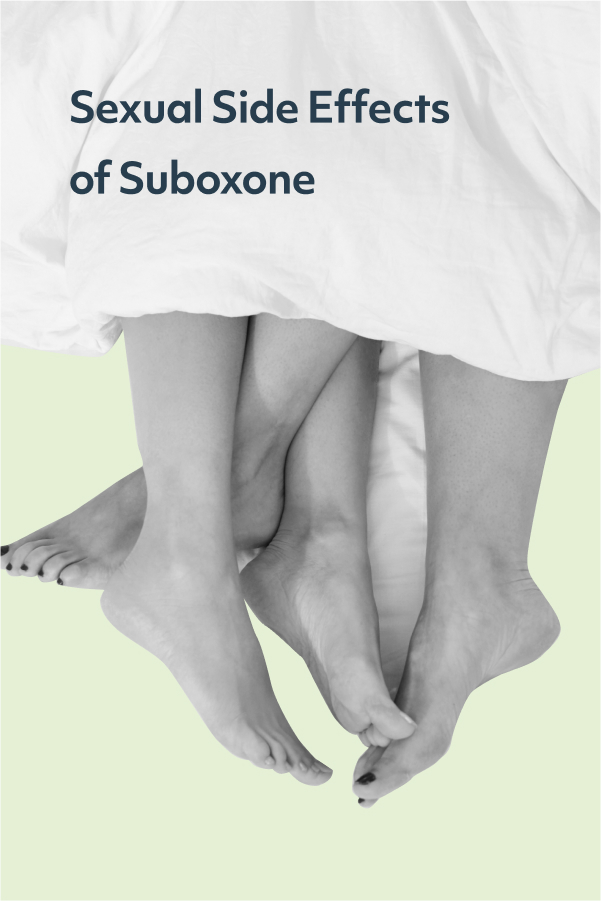Suboxone is a common prescription medication for opioid use disorder (some people say opioid dependence or opioid addiction). Suboxone treatment reduces cravings, stabilizes recovery, and helps make withdrawal symptoms to be more easily managed. Suboxone can be a life-saving medication when assisting someone in gaining control over their opioid use disorder (opioid dependence). Still, like any medication, it can create unwanted side effects and health issues. Suboxone side effects include nausea, headaches, constipation, and insomnia. For most people, these common side effects are minimal and don’t outweigh how the medication helps people gain control and a sense of normalcy in their lives.
The unspoken sexual side effects of MAT
There are some adverse effects of Suboxone and buprenorphine treatment that many folks find embarrassing and hard to talk about. It is estimated that about 20% of people taking Suboxone or buprenorphine may experience some type of sexual impact. This may be a lower rate than experienced by those using methadone maintenance treatment but it is still significant. It has been suggested that these adverse effects occur because opioids and opioid agonists such as Suboxone can affect the body’s hypothalamic-pituitary-gonadal axis, which is responsible for producing the hormones associated with sexual functions and reproductive matters. Some of the reported sexual dysfunctions (most of which are potential side effects of all opioid use) include:
- erectile dysfunction
- reduced satisfaction during sex
- orgasmic dysfunction
- low libido (low sexual desire)
- low testosterone levels
- changes in menstruation/menstrual cycle
- infertility
- premature ejaculation/ejaculatory dysfunction
- abdominal pain
Of these sexual effects, the most commonly occurring ones have been reported to be erectile dysfunction and decreased sex drive. Both men and women report that Suboxone can diminish sexual desire, making it more difficult to orgasm in turn impacting their overall sexual health.
For many these side effects matter
From the outside, the risk of opioid-induced sexual dysfunction might sound like a small price to pay to recover from opioid use disorder. The impact on one’s sexual health can have repercussions for an individual’s relationships, sense of satisfaction with life, and decreased self-esteem; It also can create barriers to long-term recovery. Sexual dysfunction can make people feel defective or broken. Some people feel ashamed and want to stop treatment for opioid use early in an attempt to rectify the situation. It’s important to remember, though, that opioid use on its own causes sexual dysfunction. So if quitting treatment leads to a relapse or if there has been long-term opioid use, sexual function may not improve.
Talk to your medical provider about treatment options
While the side effects listed above can be concerning, there is good news. If you experience them, you are not alone and they are treatable!
There are many medical treatment options for sexual dysfunction available while taking Suboxone. If you experience any form of sexual dysfunction or unwanted side effects while taking Suboxone, talk with your clinician about alternative treatments. They can tell you about treatment options, which may include medications to alleviate some of the side effects. Some possible treatments may include:
- hormone therapy to mitigate low testosterone and balance hormone levels
- adjusting your Suboxone dose—NOTE: This should only be done under your clinician’s supervision
- erectile dysfunction medications like sildenafil (Viagra), tadalafil (Cialis), and vardenafil (Levitra)
- medications for female libido like flibanserin (Addyi)
- oral contraception pills
- psychosexual and behavioral therapy—because human sexuality is complex and heavily influenced by our mental and emotional states
There have been cases of drug interaction effects between Suboxone and some of these medications, so be sure to talk through what to expect and how to take them with your healthcare provider. We strongly recommend against experimenting on your own with medications acquired illicitly.
There is some anecdotal support for using natural supplements to increase a person’s libido. Some of these supplements include:
Research is limited on these supplements, so it is unclear how effective they may be (or if they have an effect at all). And just because a supplement is natural, that doesn’t mean it is definitely safe to take. Talk to your clinician about ways supplements might affect you and how they may interact with your medications before taking any of them.
It is also important that you communicate with your partner about what you’re experiencing and why. Healthy communication with your partner can lead to an increased feeling of intimacy, which may relieve some of the pressure of worrying about your performance with your sexual partner.
Don’t let worry about sexual side effects derail your recovery
Overall, the sexual side effects of Suboxone may be effectively managed. You can find satisfaction in your personal life, while still continuing the life-saving medication-assisted treatment. No individual should need to sacrifice their quality of life or sexual satisfaction in order to achieve long-term recovery.









